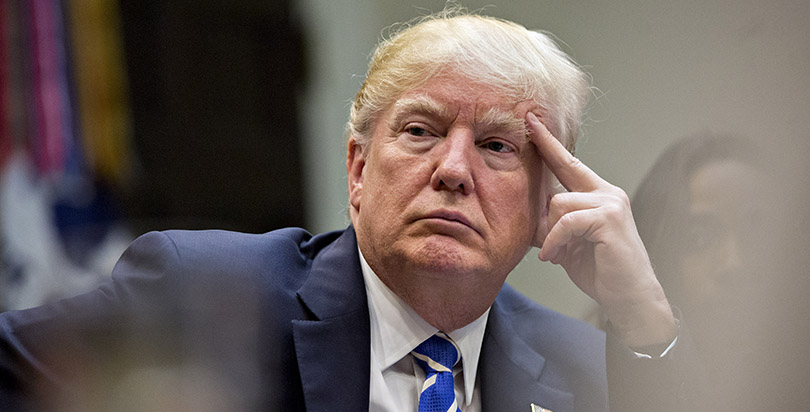As Trump Readies Sweeping Tax Reform, School Choice Experts Argue Merits of Federal Tax Credit Scholarships

Washington, D.C.
President Trump is set to unveil his far-reaching tax reform proposal Wednesday, and the eyes of the education world will be focused on whether it includes the creation of a federal tax credit scholarship program.
A day earlier, advocates at a Thomas B. Fordham Institute event debated not just the best way to design such a program — should states be allowed to opt in or out — but whether or not it was wise for the federal government to oversee.
Thomas Carroll, president of Invest in Education, a group that has advocated for New York state to adopt a tax credit scholarship, argued that given universal Republican control of the federal government, private school choice advocates should seize the moment.
This is a “once-in-a-lifetime opportunity to get something very bold done on school choice, something that applies to all 50 states,” he said.
Programs existed in 17 states as of January, according to the National Conference of State Legislatures.
74 Explains: Tax Credit Scholarships

Trump on the campaign trail proposed a $20 billion school choice program, much of which advocates believe would come from offering federal tax breaks to individuals and businesses who donate to nonprofits that then award grants to students, usually from low-income families, to attend private school.
Education Secretary Betsy DeVos has long advocated for increasing private school choice options, a key point of friction during her contentious confirmation process earlier this year.
Carroll also challenged a common argument from very conservative advocates who say that even if a school choice program designed under a Republican president was a good idea, it could morph later into heavy regulation of private schools under a Democratic White House. (Massachusetts Sen. Elizabeth Warren is often cast as the presidential bogeyman in this scenario.)
(The 74: Will the Same Conservative Coalition That Derailed Health Care Bill Now Kill Federal School Choice?)
That bureaucratic creep is an “ever-present threat,” but not one unique to education, Carroll argued. Advocates should fight against it, if and when it does occur in a hypothetical tax credit scholarship program, but not let such qualms end a program before it even begins, he said.
Neal McCluskey, director of the Center for Educational Freedom at the Cato Institute, a libertarian think tank, argued that there are plenty of good reasons — constitutional and political — not to make a big federal school choice program.
“Let’s not be enticed by this shiny object,” he urged.
McCluskey and conservatives have long said that there is no federal role in education because the Constitution does not explicitly grant one.
“The Constitution has to matter … If we’re going to stop the federal government from doing all sorts of things in education … then we can’t say, ‘But we’re going to push the rule of law aside for something that we like,’ ” McCluskey said.
Carroll later said that libertarians have had decades to successfully challenge the federal role in K-12 education and haven’t done so. A tax credit scholarship program could be seen as being implemented through the federal government’s power to tax, one that’s generally accepted by libertarians, he said.
The regulatory threat is real, McCluskey warned. It’s already visible in higher education, where colleges that accept students with federal financial aid are subject to all sorts of regulations, he said.
And getting back to the architect of federal tax reform, Trump could end up being toxic to the school choice movement regardless of the opportunities presented by Republican control of both Congress and the White House.
“Whether you like Trump or not,” McCluskey said, “I’m not sure the association with the Trump administration is politically positive.”
A second panel discussed how to design a federal school choice program — whether states should have the choice to opt in or be obligated to participate.
Darla Romfo, president and chief operating officer of the Children’s Scholarship Fund, argued that a 50-state requirement is necessary to serve the most children as fast as possible.
“Maybe everything about how to do this isn’t perfect, but put yourself in the shoes of a parent who is getting up every day with the hopeless sense that [their child is] not going to learn, [the school is] not going to be safe, it doesn’t express my values,” she urged.
Travis Pillow, editor at Step Up for Students, the organization that runs Florida’s tax credit scholarship program, argued that one approach could be to set up tax credit scholarships like the health care exchanges created under Obamacare. The reference elicited some amused responses from the conservative crowd. The gathering was also sponsored by the Hoover Instituition and Education Next.
Guess I need to learn to be careful with my Obamacare references #4Options4Choice
— Travis Pillow (@travispillow) April 25, 2017
Each state could set parameters for its own program, and if they didn’t do so, the federal government would create a national backstop to make sure citizens of non-participating states could receive the benefits.
That approach might have a better chance of passing with the most conservative members of the House, often called the House Freedom Caucus, who oppose federal mandates on states, while still building support but “ultimately ensure that we create a 50-state constituency,” Pillow said.
Get stories like these delivered straight to your inbox. Sign up for The 74 Newsletter

;)
